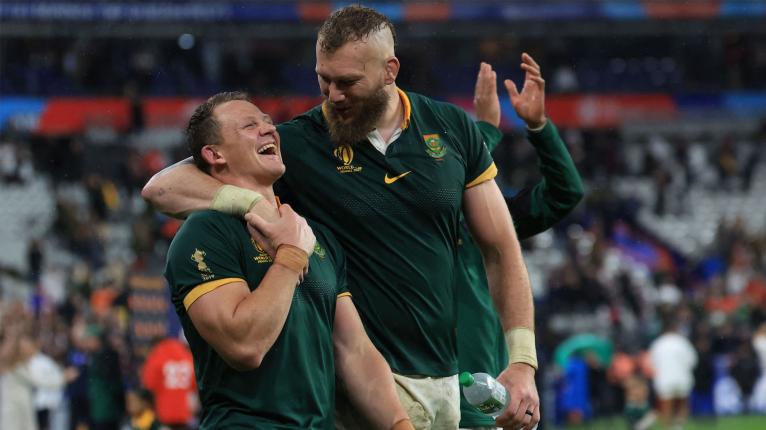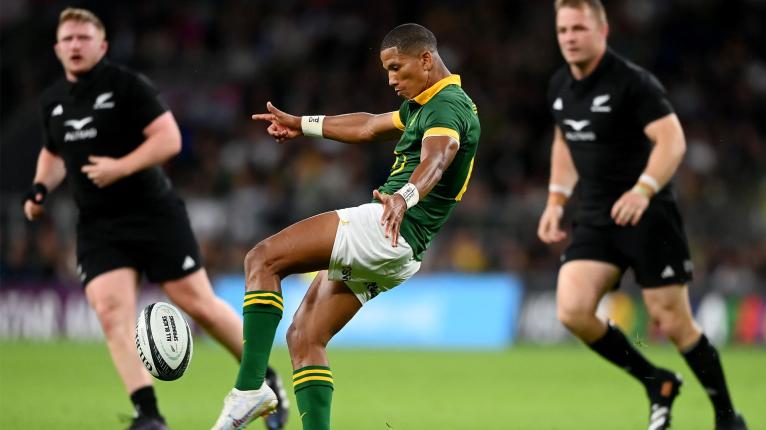Jacques Nienaber could once again be left to rue a somewhat controversial selection decision when full-time is whistled at the Stade de France on Saturday night.
Nienaber has made just two changes to the starting line-up that earned hard-fought victories over France and England in successive weekends for what will be the most important game of his career as Springboks head coach.
Facing off against an All Blacks side in red-hot form, Nienaber has dropped his two starting halves, Cobus Reinach and Manie Libbok, replacing them with the experienced due of Faf de Klerk and Handre Pollard. Neither Reinach nor Libbok have even been considered important enough to include on the bench, with South Africa opting for a 7-1 split for the World Cup final.
Much has been made in recent times of the make-up of the Springboks bench. Nienaber’s decision to run with just one backline reserve will look very foolish indeed if injuries come into play early in the fixture but it’s otherwise a decision that could the Springboks the extra grunt needed off the pine to secure a record fourth title.
It’s not necessarily the composition of the bench that’s so hard to understand, however, because it’s something that Nienaber has employed in the past. A 7-1 bench split was also used by the coach In South Africa’s biggest ever win over New Zealand, played just weeks before the World Cup kicked off, and again in the team’s World Cup loss to Ireland. Otherwise, the Springboks have regularly run with six forwards and two backs on the bench, which is still a deviation from the norm (at least compared to other teams).

The decision that is hard to wrap your head around, however, is the complete omission of Manie Libbok from the match-day squad.
When Handre Pollard was struck down by a hamstring injury towards the back-end of the Premiership season, there was a reasonable amount of intrigue surrounding who would step in to the replace the Springboks’ first-choice pivot. Elton Jantjies was Pollard’s primary backup under Rassie Erasmus and Jacques Nienaber until a string of less than impressive performances coupled with a few off-field issues saw the 33-year-old culled from the squad following the 2022 Rugby Championship. With Pollard unavailable for South Africa’s trip north thanks to a knee injury, utility back Damian Willemse stepped into the breach and Libbok earned his first Test caps off the reserves bench.
While Willemse was by no means a disaster in the No 10 jersey, he never quite looked a natural fit, and the 25-year-old was shifted to fullback for the Springboks in 2023 to replace an ageing Willie le Roux, with Libbok now deemed ready to lead the team at flyhalf.
By all accounts, the young Stormers playmaker has made a fairly smooth transition to Test rugby – rarely looking out of his depth and helping to unlock a few tight defences throughout this year’s Rugby Championship. While most teams expect their flyhalf to be their major decision maker on the park, the Springboks have delegated much of that responsibility in recent years to the scrumhalf and fullback, which in theory should make it easier for new first five-eighths to transition into the team.
It’s Libbok who has lead the team to their highest highs in 2023, playing a major role in South Africa’s biggest ever win over the All Blacks when they faced off at Twickenham.
When a still-injured Pollard was left out of the squad for the Rugby World Cup, South African fans were understandably disappointed – but there were no crippling concerns surrounding who would don No 10 because Libbok had taken to the role like a duck to water in the early stages of the year. His strong form continued against the All Blacks at Twickenham and throughout the World Cup, with the only blip being a couple of goal-kicking yips during South Africa’s only loss at the tournament to date, their clash with Ireland.
Some were quick to suggest that if the Springboks had a more accurate kicker at the Stade de France, they would have taken home the spoils. Of course, that suggests that everything else would have remained unchanged on the night, which obviously would not have been the case.
Pollard is known for his accuracy off the tee and while he’s guiding the ball through the poles more consistently in 2023 (at an 86 per cent strike rate compared to Libbok’s 64 per cent), their hit-rate throughout the 2022 season was not markedly different, with the pair both sitting around the 80 per cent mark. Since the loss to Ireland, Libbok has missed just one attempt on the posts.
It’s Libbok who has lead the team to their highest highs in 2023, playing a major role in South Africa’s biggest ever win over the All Blacks when they faced off at Twickenham and again in the side’s World Cup quarter-final clash with a more-fancied France side. While the 26-year-old wasn’t able to unlock the English defence in torrid conditions in the semi-final win, he wasn’t exactly off his game either.

When Malcolm Marx was struck down with injury earlier in the tournament, Pollard was brought into the Springboks squad off the back of 30 minutes of action for Leicester in mid-September – his first match in almost four months. The experienced flyhalf played 50 minutes in the No 10 jersey against Tonga and clocked up another half-hour of action off the pine against France.
Early in the second half of the semi-final, Libbok was pulled from the field with Pollard taking his place at first receiver and while Pollard also didn’t put a foot wrong for the Springboks, he also didn’t ignited the backline or perform miracles off the boot. One expertly taken penalty from 45 metres out was ostensibly enough for the 29-year-old to be crowned player of the match, however, and the head coach has now reinstated him at No 10 for the what will be biggest game of Nienaber’s coaching career. Libbok, meanwhile, hasn’t even made the 23.
“If we’d gone with 5-3 split he would have played,” Nienaber said of his dropped flyhalf. “They (Libbok and scrumhalf Cobus Reinach) are unlucky because of the tactics that we think we will deploy.
“World Cup finals are not necessarily the most spectacular affairs. If you look at past games it is always tight and this one is going to be tight. It’s going to be a grind.”
Libbok is one of four high-performing backs from the 35-7 victory [over the All Blacks] who won’t feature in the World Cup final.
It’s a bold call from Nienaber, especially after Libbok was so effective against New Zealand in both his opportunities against the All Blacks in 2023, off the pine at Mount Smart and in the starting role at Twickenham.
In fact, Libbok is one of four high-performing backs from the 35-7 victory who won’t feature in the World Cup final, with Makazole Mapimpi, Andre Esterhuizen and Canan Moodie all absent. Apart from the injury-enforced change at hooker which will see Bongi Mbonambi start in place of Malcolm Marx, Nienaber has kept the forward pack in-tact.
In contrast, All Blacks coach Ian Foster has opted for the exact same starting XV that did a number on the Springboks in Auckland.
After the Springboks bested an NZ side lacking confidence in Mbombela last year, Nienaber made another curious selection decision, benching Marx for the rematch the following week at Ellis Park. Marx had been a massive thorn in the All Blacks’ side in the opening exchanges of the first fixture, causing havoc at the breakdown and ensuring Foster’s men were never able to get on the front foot. The following week, with Marx watching from the pine, the All Blacks were able to assert themselves early in the game and raced out to a 15-0 lead at the half-hour mark. By the time Marx entered the fray, there was little he could do to quell the black tide.

Saturday’s fixture in Paris won’t play out like the match at Twickenham – nor the game at Mount Smart, for that matter. Rain is likely to play a major factor in the result and Nienaber has evidently gambled on the fact that Pollard – with 125 minutes of rugby under his belt in the last five months – is the best man to guide the Springboks around the park.
A 7-1 bench is an unusual proposition but it’s a strategy that becomes especially hard to comprehend when it forces the omission of one of the Springboks’ most influential players from throughout the season to date. After leading South Africa to a World Cup final, Manie Libbok now finds himself surplus to requirements.
If things don’t go Pollard’s way on Saturday night, there is no Plan B; South Africa’s hopes of World Cup glory will live and die by the performance of their returning star. It’s a bold move from Jacques Nienaber – and a risky ploy that could come back to bite a Boks team that’s performed so well at the World Cup to date without having to rely on radical strategies.



Comments
Join free and tell us what you really think!
Sign up for free